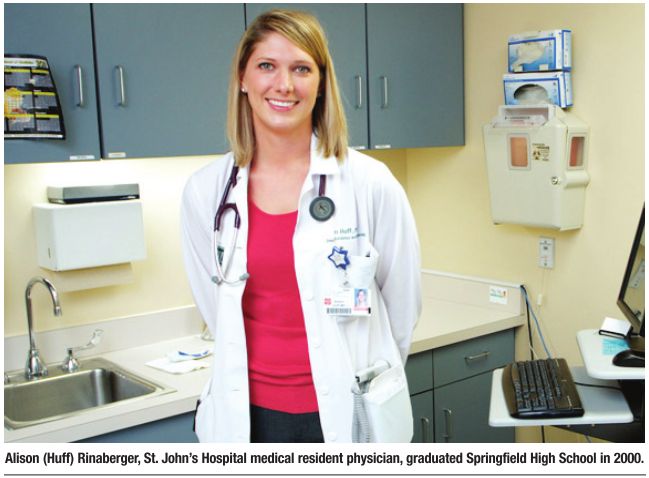District 186 explores the successful life
DYSPEPSIANA | James Krohe Jr.

Springfield’s School District 186 has set up a web page titled “Where Are They Now?” On it, graduates of Springfield public schools are invited to “share their success stories with the SPS community.” In fact the purpose of the website is to share District 186’s success stories with the larger Springfield community; the spinning at schools these days gets done in board offices, not playgrounds. Be that as it may, we are thus introduced to three bright and appealing recent grads that any school system would be proud of.
A district spokesman explained that “success” for purposes of sharing is “some sort of successful life.” “We’re defining that very broadly,” he told the SJ-R, to include “anybody who is doing what they want to do in life.” Any 186 alum who can boast of doing what they want to do in life is successful indeed. Most of us are obliged to do in life only what we can, not what we want – unless “what we want” is narrowly defined as “choosing from among the practical alternatives.”
Perhaps you read about Steve Jobs famous 2005 commencement address to Stanford grads. Jobs admonished them to seek their dream job. Atlantic Monthly editor and blogger Meagan McArdle, who is the sensible aunt we all wish we’d had, noted that this is great advice – for Steve Jobs. Not every school leaver is Steve Jobs, she pointed out, and even if they were, there are only a few jobs out there like running Apple. McArdle suggested that our universities might do better to bring in “the regional sales manager for a medical supplies firm to say, ‘Yeah, I didn’t get to be CEO. But I wake up happy most mornings, my kids are great, and my golf game gets better every year.’” For decades the relentless focus of our schools has been making a living, not making a life. Among the worthies enshrined in local high school halls of fame are teachers, scientists and public servants, but whatever their calling, each is there because he or she had a successful career. The fact that so many Americans assume that this also means a successful life is proof of how poorly they were prepared for the latter.
I am making too much of this, of course.
But how to achieve a successful life, or even what a successful life might be, are important questions that, unfortunately, are not answered by the three recent 186 grads whose stories have been posted to date. They tell us a bit about who they are and what they do, and a great deal (50, 65 and 78 percent respectively) about how District 186 helped them as children. About how they made the choices they did, or why, we learn nothing. Apparently all it takes to become a physician or a chief technology officer of a biotech startup or a rising actress in New York is to attend 186 schools.
I wish they’d told me that. New graduates will have to find their own way, as always, and as always most will get lost along the way. Sort of like spawning salmon, enough will make it to keep the dream alive. Consider the example of Charles Blanchard, Springfield High School Class of 1965. I knew Charlie Blanchard, as he then was, as the president of a service club to which I belonged at SHS. His background ordinarily seemed to have doomed him to a life in law, but stints teaching English for the Peace Corps in Cameroon and living in an artists’ community in Georgia suggested ways by which the music of his life need not be forever marred by “whereofs” or “heretos.”
Today Blanchard makes rugs in colors and patterns that echo West Africa, India and the Himalayas in his studio in the small (pop. 431) town of Narrowsburg, in the Delaware Valley of upstate New York. “Narrowsburg weaver ditches a traditional upbringing for a very un-traditional life,” went one headline about him.
Another reporter waxed poetic in the hometown paper, “Each morning, Charles Blanchard leaves the upstairs apartment he rents for a song on Main, walks a block and goes into his dark shop on the opposite side of the street. He slides off his shoes, takes a seat behind his gigantic loom and weaves rich, colorful creations by hand all day. It’s exactly the life he wanted.”
I think even better of Charles now than I did back at Springfield High 45 years ago, and I would think better of the Springfield schools if they didn’t focus so relentlessly on preparing their charges for the kind of life that our Charles Blanchards feel compelled to ditch.
Charles Blanchard’s work is available at www.dyberryweaver.com.
Contact James Krohe Jr. at [email protected].
Editor’s note
That the city of Springfield has reversed course and now stands ready to provide health benefits to civil-union partners of public employees is a good thing. But a committee that meets behind closed doors to decide public policy and puts taxpayers at risk of lawsuits should not be deciding how the city will spend more than $20 million a year on health benefits. We live in a democracy where any politician worth salt preaches accountability. It is time to end the secret meetings and make the rhetoric real. –Fletcher Farrar, editor